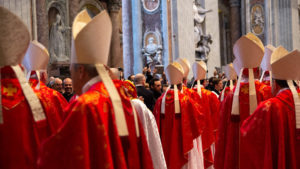His Way Alone (#1)
Oh Lord, my God,
When I, in awesome wonder,
Consider all the worlds Thy hands have made,
I see the stars, I hear the rolling thunder,
Thy power throughout the universe displayed,
Then sings my soul, my Savior God to Thee
How great Thou art, how great Thou art!
Then sings my soul, my Savior God to Thee
How great Thou art, how great Thou art!
And when I think that God, His Son not sparing,
Sent Him to die, I scarce can take it in.
That on the cross, my burden gladly bearing,
He bled and died to take away my sin,
Then sings my soul, my Savior God to Thee,
How great Thou art, how great Thou art!
Then sings my soul, my Savior God to Thee,
How great Thou art, how great Thou art!
– Stuart Keene Hine (1899-1989), from “How Great Thou Art” (1949)
 This beautiful frame-hymn expresses in two primary stanzas the impossible conundrum that lies at the heart of the entire Christian religion. Christianity teaches us that the genuine God is infinitely powerful and loves each of us completely! And yet, Christianity also teaches us that God is flat unable to forgive us for even our most trivial sins unless God first receives the sin-sacrifice of God’s Own Son’s brutal crucifixion. Having recently graduated from majoring in early Christian history in college not long before I took my Catholic conversion lessons in preparation for my marriage (which marriage has, with God’s help, lasted for fifty-two years now and counting), I naturally had a lot of trouble accepting this paradoxical set of teachings. And yet, back then, I was going to have to accept the Catholic certainty that an infinitely loving God still needs that sacrifice or God cannot forgive us, or else I could not convert to Catholicism. No Catholic conversion would have meant no marriage to my Edward, and I was so very much in love! So, I crossed my fingers behind my back, and I lied to the priest. Fortunately, God didn’t seem to mind. Then for decades thereafter, I tried my best to be a good Catholic for my husband’s sake.
This beautiful frame-hymn expresses in two primary stanzas the impossible conundrum that lies at the heart of the entire Christian religion. Christianity teaches us that the genuine God is infinitely powerful and loves each of us completely! And yet, Christianity also teaches us that God is flat unable to forgive us for even our most trivial sins unless God first receives the sin-sacrifice of God’s Own Son’s brutal crucifixion. Having recently graduated from majoring in early Christian history in college not long before I took my Catholic conversion lessons in preparation for my marriage (which marriage has, with God’s help, lasted for fifty-two years now and counting), I naturally had a lot of trouble accepting this paradoxical set of teachings. And yet, back then, I was going to have to accept the Catholic certainty that an infinitely loving God still needs that sacrifice or God cannot forgive us, or else I could not convert to Catholicism. No Catholic conversion would have meant no marriage to my Edward, and I was so very much in love! So, I crossed my fingers behind my back, and I lied to the priest. Fortunately, God didn’t seem to mind. Then for decades thereafter, I tried my best to be a good Catholic for my husband’s sake.
 This impossible conundrum remains at the heart of the Christian religion, even today. Here is a Quora answer given to that same key unanswerable question that nearly wrecked my marriage. It was given by someone who clearly never has read the Gospel words of Jesus! The question someone asked was precisely the same question that the priest who converted me to Catholicism fifty years ago could not answer for me. Someone asked, “Why did God send His Son to die for our sins, when God has infinite power so He could just have outright forgiven us?” I will not embarrass the responder, who presumably has Christian credentials, by giving you her name. But her long and absurd answer to the questioner on Quora was this:
This impossible conundrum remains at the heart of the Christian religion, even today. Here is a Quora answer given to that same key unanswerable question that nearly wrecked my marriage. It was given by someone who clearly never has read the Gospel words of Jesus! The question someone asked was precisely the same question that the priest who converted me to Catholicism fifty years ago could not answer for me. Someone asked, “Why did God send His Son to die for our sins, when God has infinite power so He could just have outright forgiven us?” I will not embarrass the responder, who presumably has Christian credentials, by giving you her name. But her long and absurd answer to the questioner on Quora was this:
“God does not have the power to just say ‘we are all forgiven.’ Why not? Because God does not have the power to deny the standard of justice He Himself put in place. He cannot deny Himself. Ever. Forgiveness must meet God’s perfect standard of justice and forgiveness must be extended from that upon which it is based. So, on what is forgiveness based? Saying I am sorry? No. Neither is forgiveness just handed out all willy-nilly from a place of sentimentality. God’s four cardinal attributes are love, power, justice, and wisdom. Neither comes before or after the other. They are all perfectly balanced. Power never trumps wisdom. Love never trumps justice. Do you see? To simply hear us say “I’m sorry daddy,” and then pat us on the bottom and give us an indulgent smile is a gross violation of God’s perfect justice. And it is far removed from any application of wisdom. There is absolutely no justice in forgiving people all willy-nilly. Sending a perfect human man met all the requirements. It is mind-boggling how smart Jehovah God is.”
 What is wrong with this answer? Well, everything. But most of all, it comes from a purely human way of thinking. It has nothing whatsoever to do with anything that God ever says in the Old Testament, or that the Apostle Paul writes in the New Testament; and much more importantly, it ignores altogether everything that Jesus says to us in the Gospels. I am pretty well versed in basic Christian theology, and I cannot recall ever reading any place where this responder could have gotten her answer there, either, although it may be some variation of obscure thinking in some odd Christian sub-sect or other. But the very notion that God might artificially limit God’s Own native ability to infinitely, perfectly love and forgive us, and – worse – the idea that God’s doing that might be necessary to “perfect” God’s justice, is never imagined anywhere in any version of Christian Scripture with which I am aware. It never is even considered by Jesus in the Biblical Gospels, and it belies Jesus’s mercy given to the thief hanging beside Him on the cross.
What is wrong with this answer? Well, everything. But most of all, it comes from a purely human way of thinking. It has nothing whatsoever to do with anything that God ever says in the Old Testament, or that the Apostle Paul writes in the New Testament; and much more importantly, it ignores altogether everything that Jesus says to us in the Gospels. I am pretty well versed in basic Christian theology, and I cannot recall ever reading any place where this responder could have gotten her answer there, either, although it may be some variation of obscure thinking in some odd Christian sub-sect or other. But the very notion that God might artificially limit God’s Own native ability to infinitely, perfectly love and forgive us, and – worse – the idea that God’s doing that might be necessary to “perfect” God’s justice, is never imagined anywhere in any version of Christian Scripture with which I am aware. It never is even considered by Jesus in the Biblical Gospels, and it belies Jesus’s mercy given to the thief hanging beside Him on the cross.
 In fact, this woman’s foolish answer is the ultimate reductio ad absurdum of all of Christian theology. And as you read her answer again, you will come to see why that is true. In a reality which is composed of and created by infinitely powerful Consciousness, a reality where there is no place where God is not, you and I are profoundly safe! We live within Consciousness, which means that God is where you and I forever live and move and have our being. We are taking these brief, elective earth-lives now, and while we do that we accept amnesia for what came before these lives; but still, we are living securely within the Mind of God, And for God to create any kind of law which mandates that we are somehow beyond God’s direct forgiveness, mercy, and perfect love would be outside God’s Consciousness, and therefore impossible. Or if God actually did create such a law as this woman describes, which would require God to limit Godself to “four cardinal attributes” rather than just unbounded love, which is the highest Consciousness vibration, then God would be playing some sort of sadistic mind-game with us, which would make God less than what God is. So, again: impossible. No, we can believe what Jesus has told us about God’s infinite, perfect love for us. Within God, there is no negativity at all, beyond the minute negativity that our own puny human minds might ever briefly create.
In fact, this woman’s foolish answer is the ultimate reductio ad absurdum of all of Christian theology. And as you read her answer again, you will come to see why that is true. In a reality which is composed of and created by infinitely powerful Consciousness, a reality where there is no place where God is not, you and I are profoundly safe! We live within Consciousness, which means that God is where you and I forever live and move and have our being. We are taking these brief, elective earth-lives now, and while we do that we accept amnesia for what came before these lives; but still, we are living securely within the Mind of God, And for God to create any kind of law which mandates that we are somehow beyond God’s direct forgiveness, mercy, and perfect love would be outside God’s Consciousness, and therefore impossible. Or if God actually did create such a law as this woman describes, which would require God to limit Godself to “four cardinal attributes” rather than just unbounded love, which is the highest Consciousness vibration, then God would be playing some sort of sadistic mind-game with us, which would make God less than what God is. So, again: impossible. No, we can believe what Jesus has told us about God’s infinite, perfect love for us. Within God, there is no negativity at all, beyond the minute negativity that our own puny human minds might ever briefly create.
 So, I have come at length to accept the fact that human-created religions are in fact now, and indeed they always have been the direct enemy of our each having a free and open relationship with the genuine God. And I cannot see any way around that fact. My very dear friends, I write these sentences with considerable personal pain, because I love Christianity. I always have loved Christianity, as much as I feel the need on occasion to argue some of the theological details of it. But the hymns, the pageantry, the stained-glass windows? I still love it all! However, religions of every stripe have a long and chequered human existence, having begun defensively in the minds of fearful men in very long-ago prehistory. At first, religions were a way to conjure up imaginary gods that we might placate as people tried to make sense of the scary and incomprehensible void that was all that they could perceive around them. And to this day, the religions that people create still carry the same awful characteristics that for the most part they have had since their beginnings. For example:
So, I have come at length to accept the fact that human-created religions are in fact now, and indeed they always have been the direct enemy of our each having a free and open relationship with the genuine God. And I cannot see any way around that fact. My very dear friends, I write these sentences with considerable personal pain, because I love Christianity. I always have loved Christianity, as much as I feel the need on occasion to argue some of the theological details of it. But the hymns, the pageantry, the stained-glass windows? I still love it all! However, religions of every stripe have a long and chequered human existence, having begun defensively in the minds of fearful men in very long-ago prehistory. At first, religions were a way to conjure up imaginary gods that we might placate as people tried to make sense of the scary and incomprehensible void that was all that they could perceive around them. And to this day, the religions that people create still carry the same awful characteristics that for the most part they have had since their beginnings. For example:
 Speaking of Jesus, where does He fit in with all this talk of traditional religions? Well, actually, in point of fact, Jess does not fit in very well at all. Instead, Jesus is deeply and profoundly radical. He came to us from the genuine Godhead not to start yet one more religion; but instead, a strong argument can be made that Jesus came to us to end all religions. Jesus came to introduce to you and me the fact that there is in fact a personally knowable God of all Who would prefer to relate to each of us without any fallible human religions in the way, a Spiritual God Who loves us perfectly, and Who must not be feared! And Jesus did this, mind you, at a time and place when and where for Him to openly suggest that He meant quite literally to reinvent our whole view of the reality in which we lived could have had Him arrested and killed for that alone. No Christian church, and certainly no Catholic church will tell you that was what Jesus told us that He actually had in mind!
Speaking of Jesus, where does He fit in with all this talk of traditional religions? Well, actually, in point of fact, Jess does not fit in very well at all. Instead, Jesus is deeply and profoundly radical. He came to us from the genuine Godhead not to start yet one more religion; but instead, a strong argument can be made that Jesus came to us to end all religions. Jesus came to introduce to you and me the fact that there is in fact a personally knowable God of all Who would prefer to relate to each of us without any fallible human religions in the way, a Spiritual God Who loves us perfectly, and Who must not be feared! And Jesus did this, mind you, at a time and place when and where for Him to openly suggest that He meant quite literally to reinvent our whole view of the reality in which we lived could have had Him arrested and killed for that alone. No Christian church, and certainly no Catholic church will tell you that was what Jesus told us that He actually had in mind!
 I can recall when I was a teenager, and I was first doing my exercise of reading the Bible from cover to cover, over and over, by reading just a few pages each night. I would finish the Book of Malachi, which is the final book of the Protestant Old Testament, the words of a minor prophet written four hundred years before Jesus was born. And then, amazingly, at once I would be deep in the words of Jesus in the Gospel Book of Matthew. And, Omigod, I would at once be reading the teachings of Someone who in every way is a thoroughly modern Man.
I can recall when I was a teenager, and I was first doing my exercise of reading the Bible from cover to cover, over and over, by reading just a few pages each night. I would finish the Book of Malachi, which is the final book of the Protestant Old Testament, the words of a minor prophet written four hundred years before Jesus was born. And then, amazingly, at once I would be deep in the words of Jesus in the Gospel Book of Matthew. And, Omigod, I would at once be reading the teachings of Someone who in every way is a thoroughly modern Man.
 This contrast between the Old Testament and the advent of Jesus, with no bridge and no break in between, always keenly astounded me. Is it possible that Jesus Himself hit His timeline contemporaries on earth in much the same radical way? It wasn’t even precisely what He said, but even the way He said everything was so different! After so many months of reading Old Testament stories and prophets, we then zipped forward in time instantly by two thousand years. I found that wrenching and remarkable, even as a child bent on reading the whole Bible through. It is only very recently, though, that I have come to risk, with Thomas’s prompting, really looking at all of this evidence so frankly.
This contrast between the Old Testament and the advent of Jesus, with no bridge and no break in between, always keenly astounded me. Is it possible that Jesus Himself hit His timeline contemporaries on earth in much the same radical way? It wasn’t even precisely what He said, but even the way He said everything was so different! After so many months of reading Old Testament stories and prophets, we then zipped forward in time instantly by two thousand years. I found that wrenching and remarkable, even as a child bent on reading the whole Bible through. It is only very recently, though, that I have come to risk, with Thomas’s prompting, really looking at all of this evidence so frankly.
Jesus was born on earth as our Teacher. That much, the Christian religion understands and accepts. But how might Jesus’s original Way have developed if it had been allowed to continue as Jesus first created it, and as it so very robustly began, without any of the fear-based dogmas that Constantine and any of the later Roman Councils added to it? Let’s consider that idea next week….
When Christ shall come, with shout of acclamation,
And take me home, what joy shall fill my heart!
Then I shall bow, in humble adoration,
And then proclaim, my God, how great Thou art!
Then sings my soul, my Savior God to Thee,
How great Thou art, how great Thou art!
Then sings my soul, my Savior God to Thee,
How great Thou art, how great Thou art!
How great Thou art, how great Thou art!
– Stuart Keene Hine (1899-1989), from “How Great Thou Art” (1949)
(Many photos are from Vecteezy.com)
The post His Way Alone (#1) appeared first on Roberta Grimes.



